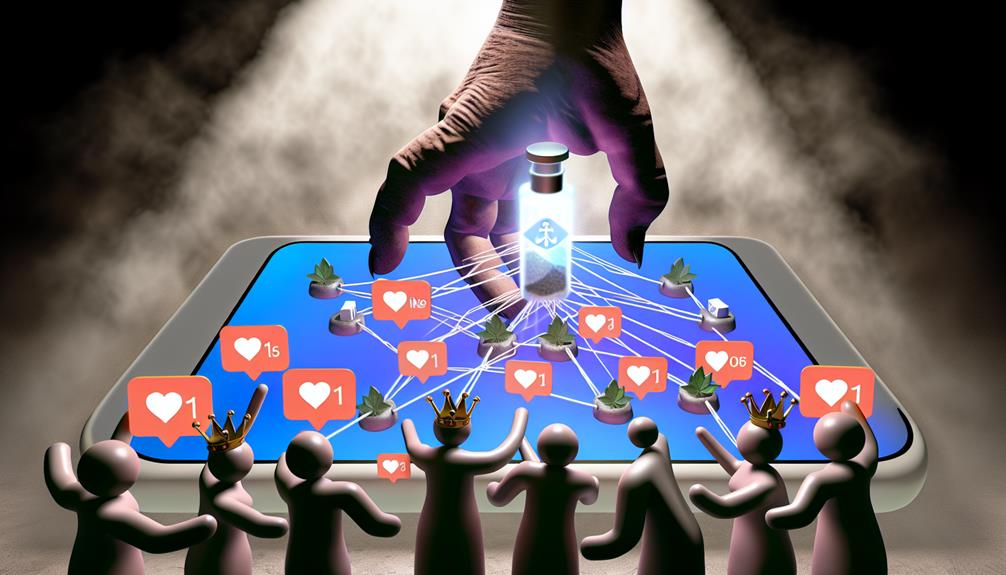They say 'you are the company you keep,' but in today's digital age, the company you keep extends far beyond your immediate circle of friends. Social media has become a powerful force in shaping our behaviors and decisions, and unfortunately, it has also played a significant role in the rise of opioid addiction.
But how exactly is social media influencing this epidemic? What are the factors at play that make it such a potent platform for promoting and perpetuating opioid abuse?
In this discussion, we will explore the impact of online communities, the influence of social media advertising, and the normalization of opioid use on these platforms.
Prepare to uncover the dangers that social media poses for addiction recovery and understand why addressing this issue is more crucial than ever.
Social Media's Impact on Opioid Addiction

Social media plays a significant role in influencing and exacerbating opioid addiction. One way in which social media impacts opioid addiction is through the provision of online support. Platforms like Facebook and Twitter allow individuals struggling with addiction to connect with others who are going through similar experiences. These online support groups can provide a sense of community and understanding that may not be readily available offline. Research has shown that individuals who participate in online support groups are more likely to engage in positive coping strategies and have a higher likelihood of sustained recovery.
However, while social media can provide a valuable source of support, it also has the potential to exert a negative influence on individuals struggling with opioid addiction. Peer influence, particularly through social media, has been found to be a significant factor in the initiation and maintenance of substance use. Seeing others post about drug use or glorifying the use of opioids can normalize and reinforce addictive behaviors.
Additionally, social media can expose individuals to triggers and cues associated with drug use, making it harder to resist cravings and maintain sobriety.
The Role of Online Communities in Addiction
The presence of online support groups for individuals struggling with opioid addiction highlights the significant role that online communities play in addressing addiction-related issues. Online support groups provide a platform for individuals to connect with others who are going through similar experiences, offering a sense of belonging and understanding that can be crucial in the recovery process.
Research has shown that community engagement, both online and offline, is a key factor in successfully overcoming addiction. Online support groups offer a convenient and accessible way for individuals to seek help and support, particularly for those who may feel uncomfortable or stigmatized seeking help in traditional settings. These online communities provide a safe and anonymous space for individuals to share their stories, seek advice, and offer support to one another.
Furthermore, online support groups can provide valuable resources and information about treatment options, coping strategies, and relapse prevention techniques. Many online communities also connect individuals with healthcare professionals and addiction specialists who can offer guidance and support. The collective knowledge and experiences shared within these communities can serve as a valuable source of information and encouragement for individuals on their recovery journey.
Influence of Social Media Advertising on Opioid Abuse

The pervasive influence of targeted advertisements on various social media platforms has been linked to the increased prevalence of opioid abuse in recent years. With the rise of influencers and their significant impact on social media, pharmaceutical companies and drug manufacturers have been utilizing marketing tactics to promote opioid medications. These advertisements often present opioids as safe and effective solutions for pain management, neglecting to mention the potential risks and addictive nature of these drugs.
Influencers play a crucial role in shaping public opinion and behavior. By partnering with pharmaceutical companies, they can subtly promote opioid medications to their followers, who may view them as trustworthy sources of information. This form of advertising blurs the line between genuine content and paid promotion, making it difficult for users to discern the true intentions behind the influencer's endorsement.
Marketing tactics used on social media platforms also contribute to the influence of these advertisements. Algorithms track users' online behavior and tailor advertisements specifically to their interests and preferences. This targeted approach increases the likelihood of users being exposed to opioid advertisements, particularly if they've previously shown an interest in pain management or related topics.
Furthermore, social media platforms have become breeding grounds for misinformation and false claims regarding opioids. Users, influenced by inaccurate information, might be more inclined to misuse or abuse these drugs, leading to addiction and other harmful consequences.
The Normalization of Opioid Use on Social Media
With the prevalence of targeted advertisements and influencers promoting opioid medications on social media, the normalization of opioid use has become a concerning trend. Social media platforms provide an ideal environment for the dissemination of information, and unfortunately, this includes the promotion of opioid use. The stigma surrounding opioids is well-documented, with many individuals associating them with addiction and negative consequences. However, the constant exposure to these drugs on social media can desensitize individuals to the dangers and risks associated with opioid use.
One of the key issues with the normalization of opioid use on social media is the potential for desensitization to addiction. When individuals are repeatedly exposed to content that portrays opioids in a positive light, it can diminish the perceived severity of addiction. This desensitization can lead to a blurring of the lines between recreational use and abuse, making it easier for individuals to justify their own consumption of opioids.
Furthermore, the normalization of opioid use on social media can contribute to the perpetuation of the stigma surrounding addiction. By presenting opioids as a normal part of daily life, social media influencers and targeted advertisements can reinforce the idea that addiction is a personal failing rather than a complex medical condition. This can discourage individuals from seeking help, as they may fear judgment and discrimination.
Addressing the Dangers of Social Media for Addiction Recovery

Addressing the dangers of social media for addiction recovery requires implementing strategies to mitigate the negative impact of online platforms on individuals seeking to overcome substance abuse. One potential strategy is the use of online support groups. These virtual communities provide a space for individuals in recovery to connect with others who've had similar experiences and can offer valuable support and guidance. Online support groups can be accessed at any time, allowing individuals to receive assistance and encouragement whenever they need it.
Another strategy is digital detoxification. This involves taking a break from social media and other online platforms to reduce exposure to triggering content and potential negative influences. Studies have shown that excessive use of social media can lead to feelings of inadequacy, low self-esteem, and increased anxiety, which can hinder the recovery process. By taking a step back from the online world, individuals can focus on their own well-being and recovery without the distractions and pressures of social media.
It is important for addiction recovery programs and healthcare professionals to educate individuals about the dangers of social media and provide them with the necessary tools to navigate these platforms safely. By incorporating strategies such as online support groups and digital detoxification, individuals can minimize the negative impact of social media and enhance their chances of successful recovery.








